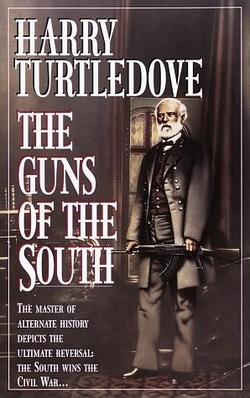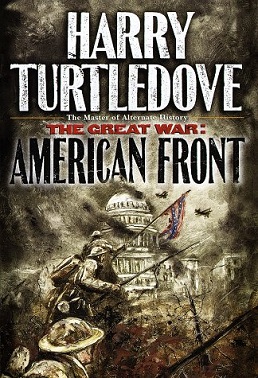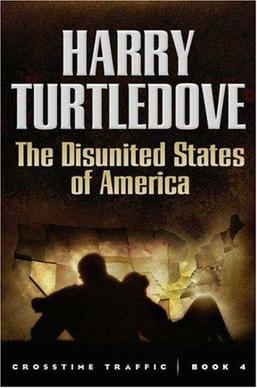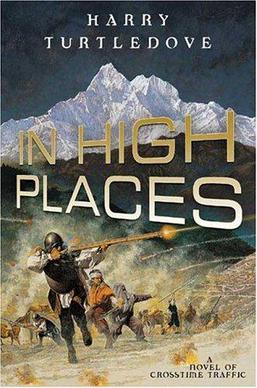
Harry Norman Turtledove is an American author who is best known for his work in the genres of alternate history, historical fiction, fantasy, science fiction, and mystery fiction. He is a student of history and completed his PhD in Byzantine history. His dissertation was on the period AD 565–582. He lives in Southern California.

The Guns of the South is an alternate history novel set during the American Civil War by Harry Turtledove. It was released in the United States on September 22, 1992.
The Southern Victory series or Timeline-191 is a series of eleven alternate history novels by author Harry Turtledove, beginning with How Few Remain (1997) and published over a decade. The period addressed in the series begins during the Civil War and spans nine decades, up to the mid-1940s. In the series, the Confederate States defeats the United States of America in 1862, therefore making good its attempt at secession and becoming an independent nation. Subsequent books are built on imagining events based on this alternate timeline.

The Great War: American Front is the first alternate history novel in the Great War trilogy by Harry Turtledove. It is the second part of Turtledove's Southern Victory series of novels. It takes the Southern Victory Series from 1914 to 1915.
"The Last Article" (1988), is an alternate history short story by Harry Turtledove.

The Great War: Breakthroughs is the third and final installment of the Great War trilogy in the Southern Victory series of alternate history novels by Harry Turtledove. It takes the Southern Victory Series to 1917.

The Disunited States of America is an alternate history novel by Harry Turtledove. It is a part of the Crosstime Traffic series, and takes place in an alternate world where the U.S. was never able to agree on a constitution and continued to govern under the Articles of Confederation. By the early 1800s, the nation dissolved with each state as a separate country. The states trade with each other, engage in diplomacy, and even go to war with each other. Other states exist which do not in our world, such as Boone.

In High Places is an alternate history novel by Harry Turtledove. It is a part of the Crosstime Traffic series, and takes place in an alternate world where the Black Death was much more virulent, killing 80 percent of the European population, with the continent subsequently repopulated by Muslims.

A Different Flesh is a collection of alternate history short stories by American writer Harry Turtledove. The stories are set in a world in which Homo erectus, along with various megafauna, survived to the modern times in the Americas as the Native Americans along with any other human cultures.

Counting Up, Counting Down is a collection of short stories by Harry Turtledove, most of which were first published in various fiction magazines in the 1990s. It is named after two of the stories appearing in the book, one called "Forty, Counting Down" and the other named "Twenty-One, Counting Up", which are united by the character of Justin Kloster. The story genres represented include alternate history, time travel, fantasy, straight historical fiction, and more. Two stories, "The Decoy Duck" and "The Seventh Chapter," are set in the Videssos Universe, with the former story being set before any of the other stories and books in that universe. The book was originally published by Del Rey as a trade paperback in January 2002. In the same month, it was brought out as a leatherbound limited edition by Easton Press.

Departures is a collection of alternate history stories by Harry Turtledove, first published in paperback by Del Rey Books in June 1993 and reprinted in October 1998; an ebook edition followed from the same publisher in May 2011. The first British edition was published in ebook form by Gateway/Orion in July 2013.
American Civil War alternate histories are alternate history fiction that focuses on the Civil War ending differently or not occurring. The American Civil War is a popular point of divergence in English-language alternate history fiction. The most common variants detail the victory and survival of the Confederate States. Less common variants include a Union victory under different circumstances from actual history, resulting in a different postwar situation; black American slaves freeing themselves by revolt without waiting for Lincoln's Emancipation Proclamation; a direct British and/or French intervention in the war; the survival of Lincoln during John Wilkes Booth's assassination attempt; a retelling of historical events with fantasy elements inserted; the Civil War never breaking out and a peaceful compromise being reached; and secret history tales. The point of divergence in such a story can be a "natural, realistic" event, such as one general making a different decision, or one sentry detecting an enemy invasion unlike in reality. It can also be an "unnatural" fantasy/science fiction plot device such as time travel, which usually takes the form of someone bringing modern weapons or hindsight knowledge into the past. Still another related variant is a scenario of a Civil War that breaks out at a different time from 1861 and under different circumstances.
If the South Had Won the Civil War is a 1961 alternate history book by MacKinlay Kantor, a writer who also wrote several novels about the American Civil War. It was originally published in the November 22, 1960, issue of Look magazine. It generated such a response that it was published in 1961 as a book.

Alternate Heroes is an anthology of alternate history science fiction short stories edited by Gregory Benford and Martin H. Greenberg as the second volume in their What Might Have Been series. It was first published in paperback by Bantam Spectra in January 1990, and in trade paperback by BP Books in June 2004. It was also gathered together with Alternate Empires into the omnibus anthology What Might Have Been: Volumes 1 & 2: Alternate Empires / Alternate Heroes.
"Liberating Alaska" is an alternate history short story by Harry Turtledove, published in the July/August 2018 issue of the Isaac Asimov's Science Fiction Magazine.
"Zigeuner" is a science fiction short story by Harry Turtledove, first published in the September/October issue of Asimov's Science Fiction Magazine in August, 2017. It was reprinted in The Year's Best Science Fiction: Thirty-Fifth Annual Collection, Gardner Dozois, ed. St. Martin's, 2018. It won the Sidewise Award for Alternate History for best short form work in 2017. It would also be reprinted in Turtledove's short-story collection The Best of Harry Turtledove in 2021.
"Uncle Alf" (2002) is an alternate history short story by Harry Turtledove. It was first published in Turtledove's edited anthology Alternate Generals II in 2002 and was later reprinted in his short story collection Atlantis and Other Places in 2010.

Atlantis and Other Places is a collection of short stories by Harry Turtledove. Published by Roc Books in December 2010, the collection includes two stories from Turtledove's Atlantis series Audubon in Atlantis and The Scarlet Band along with 10 other unrelated stories.
Bibliography of science fiction, fantasy, historical fiction and nonfiction writer Harry Turtledove:










